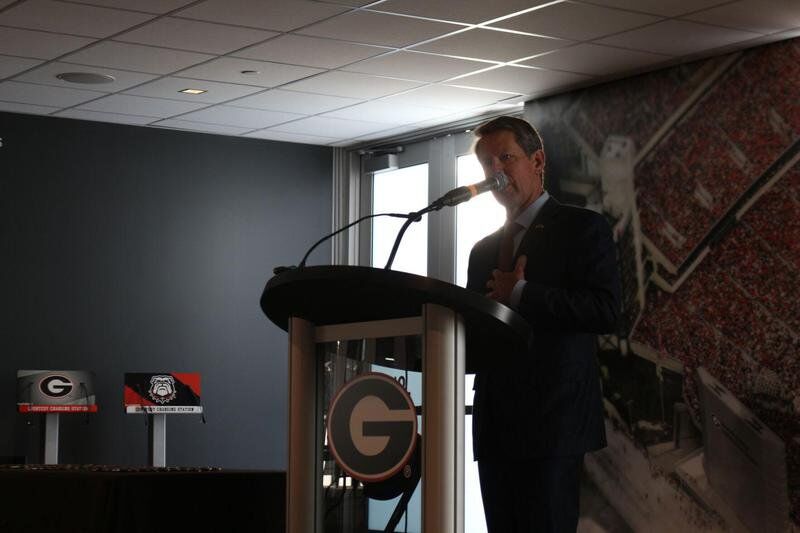Gov. Kemp signs name, image and likeness bill at Sanford Stadium
Published 4:53 pm Friday, May 7, 2021

- William Newlin | The Red & BlackGeorgia Gov. Brian Kemp speaks at a bill signing ceremony behind the west end zone of Sanford Stadium on Thursday. Kemp signed HB 617 into law Thursday morning, which paves the way for student-athletes in Georgia to make money off their name, image and likeness.
Standing behind the west end zone of Sanford Stadium Thursday morning, Gov. Brian Kemp opened a path for college athletes in Georgia to earn money while in school. Kemp signed into law House Bill 617, passed in the Georgia Assembly on March 31, which will allow student-athletes to monetize their name, image and likeness. The law will go into effect on July 1.
“I think this is a right step … to try to protect the student-athlete but also give athletes the benefit of what others are getting across the sports world,” Kemp said during the signing ceremony.
According to the law, student-athletes at Georgia’s colleges and universities can be compensated for NIL activities, such as promotional deals, selling merchandise or acting as paid social media influencers. Scholarships will not count as NIL compensation, and schools cannot revoke scholarships based on a student-athlete’s NIL revenue.
However, it’s not clear whether student-athletes can sign representation and make deals come July 1. The NCAA still prohibits student-athletes from capitalizing on their national profile to make money. Under NCAA rules, even athletes who are not on scholarship cannot void their amateur status by earning their own revenue.
In January, the NCAA Board of Governors postponed expected votes on updating NIL policy. Board member and University of Georgia President Jere Morehead said the board’s NIL committee has been “sunset” but that they still consider the issue regularly. The board has not yet passed NIL legislation opening revenue streams to student-athletes.
“Long term, our is hope is that there will be a federal solution down the road, perhaps by July 1,” Morehead said. “It may come later. It may never come. We can’t predict what Congress is going to do.”
Without an overarching NCAA policy on NIL, state legislatures and Congress have begun to introduce bills and pass laws with similar intentions. With Kemp’s signature, 12 states have now enacted NIL legislation, according to Business of College Sports. Dozens more are fielding NIL bills.
The ability to capitalize on NIL could still provide an incentive for high school recruits. Athletes may be more likely to sign with a team in a state with an NIL law, which has fed into the cascade of recent state legislation.
“Personally, [I think] it’s not good for us not to have parity throughout the country on this issue,” Kemp said. “We shouldn’t have other states that have something more than another state when we’re dealing with the same sports.”
Should players begin to make money under the new law, prominent student-athletes and those with larger social media followings could be positioned to earn far more than their teammates. In a May 5 appearance on The Paul Finebaum Show on ESPN, Georgia head coach Kirby Smart said the potential inequity could cause issues for coaches.
“It’s a little like COVID,” Smart said. “The guy that manages that best — manages the egos, and the problems or benefits that may come with [NIL compensation] — is probably going to be a little bit ahead of the opponent.”
Morehead said there’s a general consensus among Georgia’s student-athletes that the Georgia law is a positive development.
“I think the question will be how it plays out in the coming months,” Morehead said. “We’ll have to obviously work with these new rules, and I’m confident we’ll come up with good solutions that will be beneficial to our student-athletes.”
Georgia athletic director Josh Brooks has not commented on how Georgia athletes will begin to take advantage of the law as “details are not finalized,” UGA athletics said in an email to The Red & Black.
Printed with permission from the Red & Black independent student media organization based in Athens, Ga.; redandblack.com/sports

